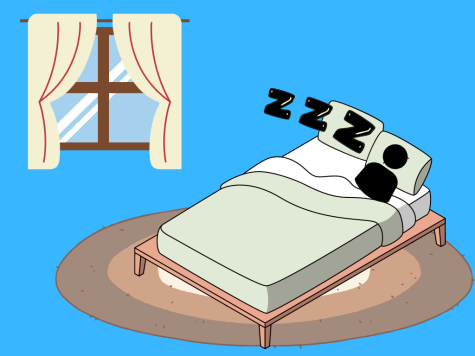More sleep for students: A dream or reality?
December 6, 2022

Many Meridian students recently responded to a form to share their sleeping habits. The results revealed a shocking widespread lack of sleep and its problematic effects on students’ lives.
78.3%. That’s the number of students who claim to not receive the optimal amount of sleep per school night, according to the student survey conducted via Schoology. Their claims are also backed by countless studies; a study by the CDC, for example, states that “about 7 out of 10 students did not get enough sleep on school nights.”
The student survey explains that a whopping 84.1% of students believe a lack of sleep affects their academic performance in school. Nature, a British weekly scientific journal, says that “sleep provides an essential function for memory consolidation (allowing us to remember what has been studied), which in turn is critical for successful academic performance.” Sleep is not only beneficial for mental health concerns, but for academic reasons as well.
Sophomore Sean Williams said he usually goes to sleep around 12 a.m. This means he is unable to rest for the recommended eight hours before he is at school again. Williams agreed that schoolwork affected his sleep schedule, explaining, “I usually spend more time focusing on school work later at night because during the day, I have other activities and other things I need to do.”
Likewise, sophomore Nico Scappa goes to bed at midnight. “I work day and night, working on Spanish, Science, and whatever else I do. I can never go to sleep early. It’s hard,” Scappa said.
Trent Bolinger, a football player and junior at Meridian, goes to sleep just one hour earlier than the two sophomores. When asked about how schoolwork affects his sleep, he replied, “I procrastinate and I have to do my homework late at night.”
According to KidsHealth, teenagers go to bed at a later time not only because of schoolwork, but a result of basic biology. The sleep hormone melatonin is released at later times for teens compared to kids and adults. It is theorized that this is because adolescence is a time of separation and individualism, therefore making kids stay up at later hours than their parents.
At Mary Ellen Henderson Middle School, students used to receive agendas that helped them structure their days. Teaching students how to manage their time so that they can get a sufficient amount of sleep per day is very important, and should be mandatory. The school should continue to provide students with either an agenda or at least a discussion on how to organize their own schedule so that kids can get enough sleep.
The school should also organize an assembly on the importance of sleep during a stable group
and provide some tips on how to increase sleep during the school week. Managing work and time is a very crucial life skill for the future.
This is an important issue. Students need to be educated on how to wisely manage their time so that they can get enough sleep.








